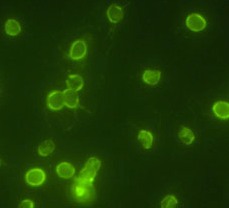

Cryptosporidium is a waterborne parasite that causes cryptosporidiosis, an infectious diarrheal disease in humans and agricultural animals. Cryptosporidium oocysts are stable in the environment and are resistant to many chemicals, including chlorine. Recreational and drinking water associated cryptosporidiosis outbreaks occur worldwide, with a single outbreak potentially affecting thousands of people. A 1993 drinking waterborne outbreak in Milwaukee affected greater than 400,000 people.
Cryptosporidium hominis and Cryptosporidium parvum are the primary causes of disease in humans. Cryptosporidium hominis is almost exclusively associated with humans while Cryptosporidium parvum also is associated with neonatal ruminants, causing calf diarrhea. Many more Cryptosporidium species and genotypes are associated with all classes of vertebrate animals. Most are adapted to a specific animal host or group of related hosts and do not cause significant disease in humans or agricultural animals.
Implementing effective, targeted prevention strategies for waterborne cryptosporidiosis requires data on the sources, fate, and transport of Cryptosporidium in different watersheds. Our research focuses on the Upper Midwest region of the United States, which boasts an extreme climate with temperatures that vary from -40°C to +40°C. We are particularly interested in how Cryptosporidium survives and persists under such harsh conditions.